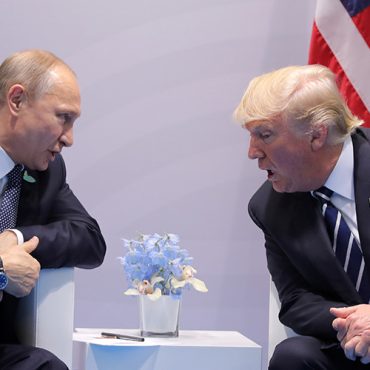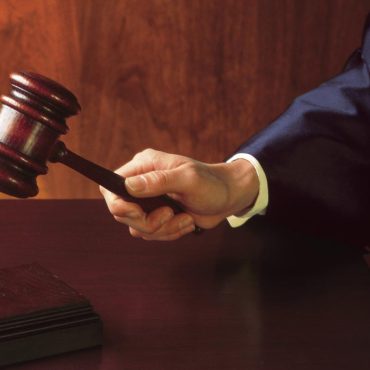This is a rush transcript. Copy may not be in its final form.
AMY GOODMAN: Thousands of Amazon workers organizing with the Teamsters union have launched the largest strike against Amazon in U.S. history. In the midst of peak holiday shopping season, drivers and workers at seven facilities in New York, Georgia, Illinois and California went on strike Thursday to pressure Amazon to come to the negotiating table as workers demand better benefits, higher wages and safer working conditions.
The strike comes days after the Senate Labor Committee, led by Senator Bernie Sanders, published a report that found Amazon systematically ignores and rejects recommended worker safety measures and deliberately misrepresents workplace injury data.
This is a video from the Teamsters with workers explaining why they’re joining the strike.
AMAZON WORKER 1: I believe a strike is definitely going to make Amazon realize that we’re not playing. We’re serious.
AMAZON WORKER 2: DBK4 has started a revolution, and I believe that Amazon will wilter under the pressure and cave in and pay us.
AMAZON WORKER 1: Amazon is not respecting us. We’ve been trying to get Amazon to recognize us as Teamsters, and they’re not coming to the table.
AMAZON WORKER 3: And that’s why now we are ready to strike and to actually show them what exactly we are fighting for.
AMY GOODMAN: On Wednesday night, just before the strike began, Amazon founder Jeff Bezos dined with President-elect Donald Trump and billionaire Elon Musk at Mar-a-Lago. Bezos also committed to donate $1 million to Trump’s inauguration fund through Amazon.
As workers continue to join picket lines at hundreds of Amazon fulfillment centers across the country, Amazon spokesperson Kelly Nantel claimed in a statement most of the workers on strike are, quote, “almost entirely outsiders, not Amazon employees or partners, and the suggestion otherwise is just another lie from the Teamsters,” unquote.
The $2 trillion company employs more than one-and-a-half million people. The Teamsters represent about 10,000 workers. Teamsters President Sean O’Brien said in a statement, quote, “If your package is delayed during the holidays, you can blame Amazon’s insatiable greed. We gave Amazon a clear deadline to come to the table and do right by our members. They ignored it,” unquote.
For more, we’re joined by two guests. Ron Sewell is with us, an Amazon associate at an Amazon facility in East Point, Georgia. He’s joining us from Fort Worth, Texas. And here in New York, we’re joined by Connor Spence, the president of the only Amazon local, ALU–IBT Local 1, at the Staten Island Amazon warehouse, the first Amazon facility to unionize.
We welcome you both to Democracy Now! Connor, let’s begin with you. Explain this strike and respond to Amazon saying these are all outsiders who are striking.
CONNOR SPENCE: Yeah, so, for more than two years at our facility, JFK and Staten Island, Amazon has been refusing to come to the table and negotiate a strong union contract with the workers. This is obviously in violation of federal law. Now, across the country, they have the same obligation with bargaining units, over 20 of them across 10 states. We are all joined together as part of the International Brotherhood of Teamsters national Amazon Division, and we’re engaging in a coordinated action to try to put the pressure on Amazon to stop breaking the law, come to the table. This is an unfair labor practice strike over their refusal to bargain.
AMY GOODMAN: And can you talk more about the significance of this largest strike against Amazon in history?
CONNOR SPENCE: Well, in the U.S., there hasn’t been large coordinated action like this. And actually, I do want to comment on the point Amazon is trying to make that this is somehow just an outsider action. You can go to any one of these picket lines where the workers have walked off the job, and see that’s not the case. Last time I was on the show, I talked about how Amazon has 150% turnover in their warehouses nationwide. Something like this, organized on this scale, has to be internal, has to be worker to worker. It has to come from the inside. The idea that this could be done by outsiders is just ridiculous on Amazon’s part. It’s really a narrative I think they want to push so that other workers who are not yet organizing don’t see this and become inspired that they can also fight to change their conditions.
AMY GOODMAN: At the Amazon picket line in Queens here in New York Thursday, police arrested, then released Teamsters organizer Anthony Rosario, as well as Jogernsyn Cardenas, one of the striking Amazon workers. NYPD agents also threatened the crowd with mass arrests. Journalist Luis Feliz Leon of Labor Notes captured the moment of Cardenas’s arrest. New York police officers swarmed Cardenas and blocked him in the cab of his van.
STRIKING WORKER: I already know, we’re good. We good. You’re going to get out. We good. You good. Yo, you good. You good. Here unite! Here unite!
POLICE OFFICER: Step back!
STRIKING WORKERS: Let him go! Let him go! Let him go!
POLICE OFFICER: Step back!
STRIKING WORKERS: Let him go!
POLICE OFFICER: Step back!
STRIKING WORKERS: Let him go! Let him go! Let him go!
AMY GOODMAN: So, if you can describe the scene and the scene around the country, Connor?
CONNOR SPENCE: I would say there’s a lot of energy, a lot of activity. I mean, I don’t think it’s like — I think it’s very significant to point out to people that it’s the dead of winter. We’re nearing the holidays. People would rather walk off the job than spend another day in the warehouse under those conditions. And I think you can really — when you go to these picket lines, you can feel that energy. The workers are — they’re tired. They feel exploited. They feel abused. And the only thing stopping more workers from taking action is just the time it takes to organize in these conditions. And it’s going to keep building, and you can sense that when you’re on the line.
AMY GOODMAN: I wanted to also bring in Ron Sewell, Amazon associate working in East Point, Georgia, also an Amazon learning ambassador, helps train new hires and other associates, punished by Amazon for organizing on safety issues. He filed an unfair labor practice against Amazon, and Amazon settled. He’s usually in Georgia but now in Fort Worth, Texas. Talk about the issues that you face and other workers face.
RONALD SEWELL: Thank you for having me.
Yes, the issues that we face there is the common safety issues, such as clean water, cool air in the South, overheating building, people passing out. And no — when I say no response from management to even speak with us or talk with us, and therefore that’s why we are in strong support of the New York picketers, and we’re doing the same thing here in the location East Point.
AMY GOODMAN: Can you talk about the dangers that workers face, the level of injury on the job? Talk about what Senator Sanders talked about in the Senate.
RONALD SEWELL: Well, the dangers in the job, what Senator Sanders talked about, is real. We have employees — just recently, last week, I had to assist an employee who passed out, that was working the early morning. And he was trying to get to a place where he can sit down, either in the break room or in the restroom. But before he even reached that area, he passed out on the floor in front of me, hitting his head, hitting his face.
So, the danger is real. It’s not something that we’re making up. We have an older population, as well as a younger population. And that’s something health-wise, safe-wise, that we submitted a request to OSHA, and we got a visit by them, and they went through the whole facility.
AMY GOODMAN: Has ATL6 in Atlanta, in East Point, unionized?
RONALD SEWELL: No, we have not unionized, but we do have the full support of the Teamsters and what have you. And we are fighting for our individual rights. And we will continue doing that and continue supporting the Teamsters and all others in getting Amazon to come, at least management, talk with us, listen to our demands, listen to our concerns.
AMY GOODMAN: If you can explain who’s unionized and who hasn’t, Connor? And explain your position. You’re the only president of a local Amazon Teamsters unit.
CONNOR SPENCE: So, in 2022, we were the first warehouse to win an actual NLRB election. Since then, many other warehouses across the country have gone through the NLRB process, not quite the same way we did. Instead, they signed a majority of their co-workers on union cards, demonstrated that majority to the company. The company, under a newer NLRB ruling, had about two weeks to contest that majority, file elections with the NLRB. They refused to do so. So, in doing so, it was a tacit recognition that those majorities exist, and therefore, that has happened at over 20 bargaining units across the country. And that number continues to grow as the movement expands and we organize more workers.
AMY GOODMAN: The Teamsters President O’Brien spoke, controversially, at the Republican convention. Do you think unions will do better under Trump?
CONNOR SPENCE: I mean, I think it remains to be seen. I’m very much a fan of the current NLRB general counsel, Jennifer Abruzzo. But I think that, ultimately, what we’ve learned, even in the past four years under Biden, is that the NLRB is not the main instrument of change here. It’s building worker power. And we have to do that under any administration, under any NLRB.
AMY GOODMAN: And are you calling for people not to use Amazon, to boycott Amazon?
CONNOR SPENCE: I think a better thing for me to say is, if you choose to shop on Amazon this holiday, a good thing to do would be to meet with your driver, have a conversation with them when they drop off your package, ask them about their working conditions. If there are things they would want to change, tell them that you’ve seen Amazon workers organizing on TV, that they should consider joining the Teamsters, and they have the full support of you and the community if they choose to do that.
AMY GOODMAN: Well, I want to thank you very much for being with us. Connor Spence is president of Amazon Labor Union-IBT Local 1. And I want to thank Ron Sewell for joining us, Amazon associate working in the ATL6 facility in East Point, Georgia, talking to us from Texas.
Coming up, as Luigi Mangione is brought to New York and charged in the killing of the CEO of UnitedHealthcare Brian Thompson, we’ll look at the growing anger directed at the health insurance industry. Stay with us.
[break]
AMY GOODMAN: “Kalasnjikov,” opening song to the film Underground and a favorite of Steven Englander, the visionary director of ABC No Rio, who died last Friday at age 63 from a rare lung disease he battled for years while securing a new site for the legendary New York City DIY art and community space. He lived long enough to see the groundbreaking in July.











Post comments (0)